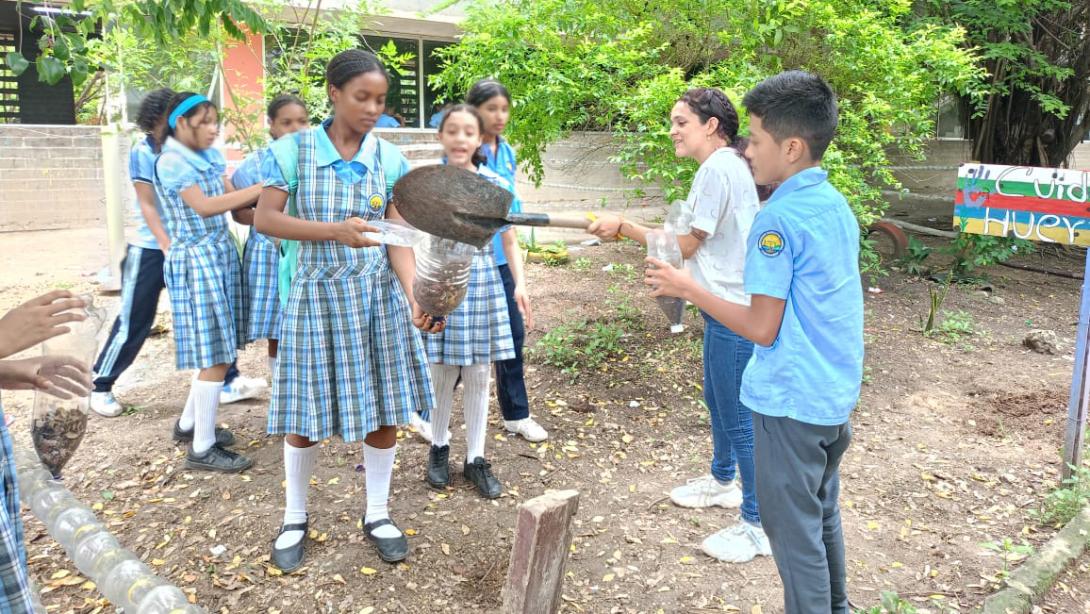World Refugee Day: Education as the pathway to transformation

Lea esta historia en español
According to the UN Refugee Agency - UNHCR, by the end of 2023 approximately 117.3 million people had been displaced from their places of origin fleeing persecution, conflicts, violence, and human rights violations. This means that one out of every 69 people in the world has had to leave their roots, family, friends, favorite places and home to embrace a new culture, often in conditions of structural impoverishment.
Amongst them, about 6.1 million people have left Venezuela and have remained in Latin American countries, 2.9 million of them in Colombia. Globally, Venezuela is the third origin country for most refugees or people in similar conditions, right after Afghanistan and Syria.
Children from Venezuela have arrived to new educational environments where they face the great challenge of resuming their learning process after a pivotal moment in their lives. Enseña por Colombia, as part of its partnership with the USAID Regional Leadership For Change in Education Program, has collaborated with USAID in prioritized regions of the country where a significant number of Venezuelan students were identified, understanding their need of support to adapt to new situations in their lives. Over 1.700 Venezuelan students in these three years have been through classrooms led by extraordinary Enseña por Colombia participants (Ecos) who, as part of their leadership training, learn about interculturality and adopt comprehensive strategies to ensure the support their students need.
For Norelvis Salgado, a sixth-grade student at Institución Educativa Rosedal in Cartagena , despite arriving in the country at the age of two with her sisters, brother-in-law, and nephew, the whole process of adaptation to her new environment proved to be very complex. Settling in a very small and unfamiliar community in a new country meant adapting to a new reality, very different from the one she had experienced at home.
However, Norelvis speaks fondly of her school in Colombia, noting that "it is very dynamic and fun when we are here." Her favorite subject, biology, is taught by her teacher Laura Cepeda, an Enseña por Colombia Eco who transforms education day by day in the country through the collective leadership she exerts and aims to instill in her students. One of the processes she promotes is the restoration of the school's garden, where she empowers her students to lead the transformation of their environment while learning about natural sciences. “An important moment for me with teacher Laura was when we were helping in the garden to restore it,” Norelvis shared. For her part, Laura explains that, "From Norelvis I have learned that she always arrives with the best attitude, she comes to school with a smile…and she is always willing to help when one needs something, she is always willing to collaborate and always has a very good disposition.”
Like Norelvis, sixth-grade student Esteban Contreras arrived in Colombia at an early age with his aunts, grandmother, and father. Although his mother stayed in Venezuela, for him, Colombia is the place where he has grown up, and his school is a place where he can learn amazing things, especially in his favorite subject: mathematics. In his natural science classes, Esteban is recognized by Laura as a committed student who always gives his best. “What I like most about my teacher Laura are her playful activities and the fact that she teaches us something new,” Esteban explained. “An important moment for me with my teacher was last year's fair, when I did a project on energies—my project was on air.”
This fair is also a special moment for Albert Farfán, another sixth-grade student at Institución Educativa Rosedal, who created a model showcasing different types of energy using his artistic talent, as this is his favorite subject. “An important moment for me and my teacher Laura was when we made the model about the energies of water, wind, and earth at the fair,” he shared. Albert arrived in Colombia at the age of five with his father to reunite with his mother, who was already working and living in the country. Although he felt safer living in Venezuela than in his new home, he has adapted to his new environment with the support of key mentors like Laura, who speaks about the challenges her student has faced and how he has managed them. She particularly values Albert's clear sense of self, his values, and his character, which he demonstrates daily. “Albert has always been very clear about who he is and the way in which he asserts that, with all of his values and his beautiful way of being.”
Like Laura, many more Ecos are creating safe environments in classrooms every day, where their migrant students are welcomed with love in their educational communities. This conscious decision to foster these spaces is born from their leadership with the aim of closing inequality gaps in Colombia and around the world. They support the processes their students are going through: both Albert and Norelvis highlight, for example, that their accent and way of speaking are some of the changes they have noticed.
From their roles in classrooms to their impact as part of the Alumni network, the Enseña por Colombia community is committed to a transformative education that supports their students' giant dreams and enables them to achieve their full potential. Norelvis dreams of becoming a doctor who helps many people, Esteban dreams of studying and working in a large company in the future, and Albert dreams of becoming a NASCAR driver, a passion he shares with his father. However, despite the diversity in their dreams, all three agree on one point: they dream of becoming changemakers who will build a better future for themselves and their families.



